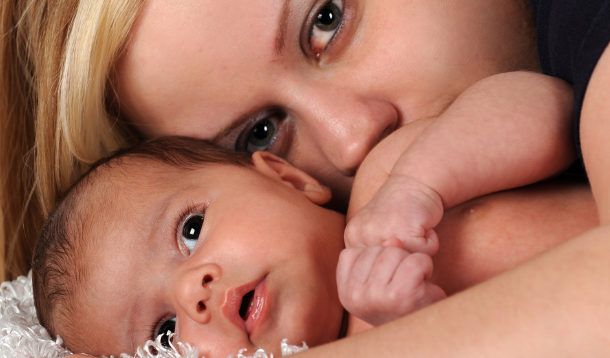
Around my child’s second birthday, I was invited to a new friend’s Blessingway: a traditional Navajo ceremony that celebrates and honours a woman who is about to give birth. I threw myself into the preparations, keen to provide the type of support that I felt had been missing in my own transition to motherhood. I baked meals for her freezer, made copies of my favourite one-pot recipes, and wrote heartfelt notes to both mother and babe. When the day came, I put on a fancy dress that I hadn’t worn since before my pregnancy, brushed glitter on my cheeks, and arrived at my friend’s house excited to radiate positivity and love. The small group of invitees clearly shared similar intentions, and the room swelled with smiles, laughter and hugs. After snacks, we gathered in a circle, and each woman offered an inspirational song, reading or activity to our very pregnant friend. When my turn came, I grinned, eagerly took out my prepared reading, and - to my utter surprise and horror - burst into tears.
The excerpt I’d intended to read was from Molly Caro May’s Body Full of Stars: Female Rage and my Passage into Motherhood. The book centers on May’s struggle to renegotiate her relationships with her body and her husband in the wake of extreme postpartum incontinence. She details the intensely personal and lonely, yet still somehow universal, journey of destabilization, perseverance, and growth that many women traverse when they become mothers, and concludes with a rousing reflection on the possibility that being ailed does not preclude being capable, beautiful, and strong. I’d chosen the text thinking it would give my friend hope regardless of how her labour and delivery unfolded. I’d failed to realize that I wouldn’t be able to explain why the book had been so illuminating to me without divulging something about the dark place I’d been in when I’d read it.
Although I haven’t suffered from postpartum incontinence of the kind that May experienced, my vacuum-assisted delivery left me with chronic pelvic pain that makes it uncomfortable and exhausting to walk, stand, sit, or lie for long periods - let alone whilst pushing a stroller, nursing, or carrying my child. But more debilitating has been the damage to my mental health. I have flashbacks, insomnia, and inexplicable waves of crippling anxiety. I hate to be touched below the waist, cannot lie on my back without wanting to cry, and begin to sweat as soon as I enter any clinical setting - with the result that I actively avoided seeking treatment for my pelvic pain for almost two years.
Sitting in the circle, barely able to choke out the reading through my tears, I was mortified at having allowed the baggage of my birth to enter this sacred space. The day wasn’t about me, an anxious voice in my head insisted, and it was supposed to be a party! My pain didn’t fit here - just as it hadn’t fit in conversations with midwives, family, and friends who’d just wanted to celebrate the safe arrival of my son in those early weeks, or who later interpreted my thriving child as evidence that I was a competent mother who must, surely, be “over it”.
After an agonizing few minutes, I got to the end of the text. I sat for a minute with my head down, breathless, humbled, and shocked. How could it be that my pain was still, two years after the birth, so close to the surface, so uncontrollable?
Eventually, I took a deep breath and looked up, expecting to see confusion, pity, or distaste on the faces of the women sitting around me. Instead, I saw tears, hands placed gently over hearts, and knowing smiles. Someone thanked me for my honesty. Then, slowly, quietly, the other mothers - even ones who had minutes before been talking about their beautiful, empowering, dimly-lit and incense-fueled home births - began to share ways in which they too had struggled, emotionally and physically, in the aftermath of their deliveries. Their hushed confessions revealed that, while their experiences varied from mine, they had each visited the darkness that haunted me. They understood. I wasn’t the only one whose pain had been dismissed by other’s dogged insistence that “healthy mom, healthy baby” meant everything was (or should be) fine. My pain didn’t make me a bad mother. I wasn’t an anomaly.
Later, still plagued by a concern that I’d misstepped, I apologized to my friend for dampening the festive atmosphere of her event. She firmly told me that I’d done everyone a favour. Although she didn’t deny that my tears had been jarring after a series of Hallmark-style positive affirmations, she thought that my honesty had made it safe for others to talk about more than just the highlight reel of their birthing and mothering experience. After I spoke, she said, people started to share things that were real - and it was real motherhood, with all of its ups and downs, that she wanted to be prepared for.
Since the Blessingway, I’ve started to take active steps to improve my physical and mental health. I’ve been to see a pelvic floor physio, and I’ve started to write again. I am more honest and open about how birth trauma has affected my first few years of mothering, and I talk often with other mothers for whom anxiety and depression are frequent companions. I used to think that being a good mother and a good friend meant shielding myself and others (particularly other moms and moms-to-be) from the darker parts of motherhood. I’ve come to realize that avoidance, denial, and a stiff upper lip won’t save anyone from the darkness: it just means we’re all walking in the dark alone.
*********
5 Things that Miscarriage Grief Made Me Realize Today
Childbirth May Cause Post-Traumatic Stress
How Yoga Can Help Families Bond